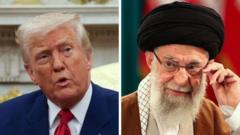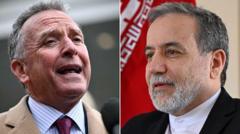Oman's new income tax is not only a shift in fiscal policy but also a reflection of changing economic realities in oil-rich Gulf nations, with implications for social equity and economic diversification.
First Income Tax in the Gulf: Oman's Bold Economic Shift

First Income Tax in the Gulf: Oman's Bold Economic Shift
Oman introduces a 5% income tax, signaling a potential economic transformation in the Gulf regions largely dependent on oil.
In a historic move, Oman has announced the introduction of a 5 percent income tax set to begin in 2028, marking the first such tax in the Persian Gulf region. Targeting individuals earning over 42,000 Omani riyals, approximately $109,000, this initiative is seen as a crucial step towards reducing the country’s overwhelming dependence on oil and gas revenues, which accounted for 70 percent of the state’s income last year.
The Omani government has justified the tax as a means to promote social equity, aiming to shift wealth distribution among its citizens who have historically benefitted from state subsidies and public-sector employment funded by fossil fuel revenues. This move may serve as a model for neighboring countries where royal families have traditionally withheld political rights while offering limited financial benefits to citizens.
For decades, the ruling families of the Gulf states have relied on revenue from oil—discovered in the 1930s—to maintain a delicate balance of stability and control. They have used resources to provide citizens with subsidies and public employment opportunities while simultaneously ensuring a tight grip on political power, with little room for citizen participation in governance.
However, as oil prices become less predictable, and spending must match reduced revenues, these governments are being prompted to think beyond their established financial frameworks. In recent years, leaders like Saudi Arabia's Crown Prince Mohammed bin Salman have initiated measures to cut subsidies, forcing citizens to adapt quickly to new pricing realities at the pump.
Oman’s decision to implement an income tax could be indicative of a broader trend in the Gulf, as other nations may take note of its effects on both social equity and fiscal health. It remains to be seen how citizens will respond to this policy change and whether it will inspire similar reforms in their oil-rich neighbors. The evolution of Oman’s economy could serve as a pivotal case study for a region navigating the complexities of transitioning from an oil-dominated fiscal structure to a more diversified economic model.






















